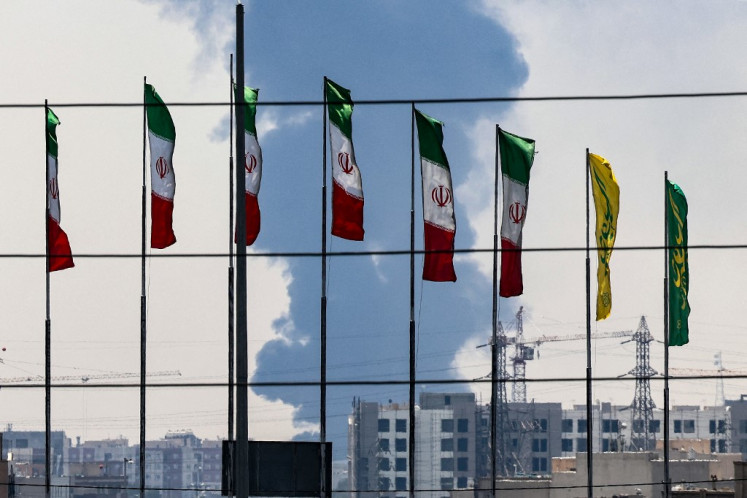Popular Reads
Top Results
Can't find what you're looking for?
View all search resultsPopular Reads
Top Results
Can't find what you're looking for?
View all search resultsCulture change and our future
During their campaign, presidential candidate pair Joko âJokowiâ Widodo and Jusuf Kalla proposed that a mental revolution was needed to build a better Indonesia
Change text size
Gift Premium Articles
to Anyone

D
uring their campaign, presidential candidate pair Joko 'Jokowi' Widodo and Jusuf Kalla proposed that a mental revolution was needed to build a better Indonesia. They could not be more right.
In a nutshell, a mental revolution is a fundamental change in the paradigm of thinking, which means a change in culture. Why is this needed?
About four decades ago, our economy and that of South Korea's were relatively similar. South Koreans value hard work, education, efficient organization, excellence, discipline, investment and thrift. Arguably, we have somewhat different values. Fast forward to today and it is clear that the Koreans enjoy a much higher standard of living. Cultures do matter.
Our country's serious problems, such as alarming inefficiency, pervasive corruption and a real lack of discipline, necessitates fundamental change. An urgent need for cultural change is called for since the old ones discourage progress. In particular, Jokowi's mental revolution must include the following changes.
First, Indonesia needs to change from a culture of mediocrity to a culture of excellence. The biggest obstacle to our development may not be corruption, but the lack of repercussions following subpar performances, which gives rise to a culture of mediocrity in our society and government.
Where nepotism trumps hard work and excellence goes unrewarded, people have little incentive to strive for excellence. They settle for doing the bare minimum. As such, underachievement becomes the norm. This is an attitude that trickles down from the very top, eventually permeating to all segments of society, including schools, universities and businesses.
In a culture of excellence, people want to perform well because they know their future depends on the merit of their performance. It's called a meritocracy. In the culture of mediocrity, however, people want to be attractive or socially well-connected, because success is earned not by achievement, but by who they know. Corruption and nepotism are the byproducts of this detrimental culture.
The challenge faced by Jokowi and Kalla is figuring out how to infuse a culture of excellence into the whole spectrum of government. They can start by selecting officials ' from cabinet members on down to lower levels ' by their merits rather than their connections; and hold them to a high standard during their tenure. Subsequently, those who do not perform must be quickly replaced.
Second, Indonesia needs a change from a culture of distrust to a culture of trust. According to the World Bank and International Finance Corporation (IFC), in 2014, Indonesia ranked 120th in the world based on the ease of doing business, far below Singapore, Malaysia, and Thailand, which ranked 1st, 6th, and 18th, respectively. It takes ten procedures and an average of 48 days to establish a corporate entity in Indonesia. That put the country near the bottom of the 189 economies, at 174. This is awful, given that it takes less than a week in Singapore and Malaysia to establish a business entity.
In addition, it takes an average of 158 days and involves 13 procedures to acquire construction permits. Coupled with the fact that nearly 500 days are required to enforce a contract ' and at a substantial cost ' doing business in the country is highly inefficient.
Why is the regulatory environment so excessive that it impedes development? The underlying paradigm is distrust by the bureaucrats for business. And as Francis Fukuyuma's scholarship has shown, in an economy where trust is lacking, business transactions are inefficient and the economy will fail to create firms that can compete in the highly competitive world.
The other underlying reason is the paradigm of thinking that views the public sector as the engine of growth rather than a provider of a favorable climate for growth. In reality, it is successful businesses, not the government, which are the engines of growth, as wealth creation occurs at the level of individual businesses.
Third, Indonesia needs a change from a blaming culture to a culture of responsibility. Bernard Lewis once observed that 'when people realize that things are going wrong, there are two questions they can ask. One is, 'what did we do wrong?' and the other is, 'who did this to us?' If the former leads to conspiracy theories and paranoia, the latter leads to, 'how do we put it right?''
In the blaming culture, identifying the causes of problems and fixing them are secondary; the primary objective is finding out who is to blame for mistakes.
In the past, there have been many mistakes committed by the government at various departments and levels. Serious delays in the building of infrastructure and power plants, fiascos in the national education exam, and the disturbing deforestation ' which is now the highest rate in the world, surpassing even Brazil ' to name a few. No one has assumed responsibility. Instead, we often hear paranoia about Western companies' takeover of Indonesia.
Developing a culture of responsibility will take time. The key to success is leading by example. So far, Jokowi and Kalla have the benefit of the doubt that they will do so. However, they should also surround themselves with individuals who are not only problem solvers, but also have the courage to admit their mistakes and give up their position to more qualified persons if the circumstances demand it.
The world is increasingly competitive. We cannot afford to do things as usual. We need a sense of urgency from the government and society to fix our fundamental problems in order to move forward.
The three aforementioned cultural changes are necessary requirements. We should applaud Jokowi and Kalla for recognizing them. The time for action can't come soon enough.
________________
The writer is a professor of economics at Azusa Pacific University in California, US, and an expert board member of the NasDem Party. The views expressed are his own









